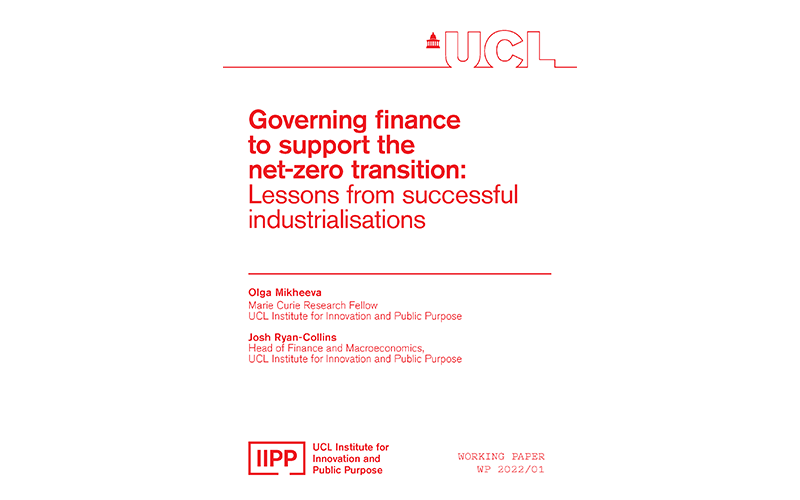Governing finance to support the net-zero transition: Lessons from successful industrialisations
This paper examines the governance of industrial credit and capital markets in countries that achieved rapid structural economic transformation and considers lessons for net-zero carbon transition.

21 January 2022
UCL Institute for Innovation and Public Purpose (IIPP) Working Paper Series: IIPP WP 2022/01
Authors:
- Olga Mikheeva | Marie Curie Research Fellow, UCL Institute for Innovation and Public Purpose
- Josh Ryan-Collins | Head of Finance and Macroeconomics, UCL Institute for Innovation and Public Purpose
Reference:
Mikheeva, O. and Ryan-Collins, J. (2022). Governing finance to support the net-zero transition: lessons from successful industrialisation. UCL Institute for Innovation and Public Purpose, Working Paper Series (No.WP 2022/01). Available at: https://www.ucl.ac.uk/bartlett/public-purpose/wp2022-01
Abstract:
The transition to a net-zero carbon economy requires a major shift in financial flows. Financial policy bodies — central banks, financial regulators and ministries of finance — clearly have a role to play in supporting such a shift. Up until now, policy discourse has envisaged this role primarily as one of enabling and de-risking private finance, via support for new ‘green finance’ markets and instruments (e.g. green bonds, sustainability taxonomies and ESG derivatives) alongside encouraging the disclosure of climate-related financial risks to support effective price discovery in financial markets. Historically, however, financial policy bodies have played a more direct and coordinative role in industrial and economic development, often via close collaboration with dedicated public financial institutions such as national development banks. This paper examines the governance of industrial credit and capital market financing in six countries — Mexico, Canada, Norway, Japan, Korea and China — which successfully and rapidly industrialised at different periods in the 20th century. We examine how central banks and ministries of finance coordinated financial policy to achieve rapid structural economic change, and consider the implications for the net-zero carbon transition.
 Close
Close

